News
Aston Bay Announces New Assays Confirming Significant High-Grade Copper at Storm Project, Nunavut
TORONTO, Ontario, November 3, 2022 – Aston Bay Holdings Ltd. (TSXV: BAY) (OTCQB: ATBHF) ("Aston Bay" or the "Company”) today reports final assay results from the 2022 drill season, confirming significant near surface high-grade copper at the Storm Copper Project (“Storm” or the “Project”) on Somerset Island, Nunavut, Canada. This is the maiden drilling program for American West Metals Limited (“American West”), who are the project operator, since entering an option agreement with Aston Bay in March 2021.
Highlights
- Diamond drilling continues to define near surface high-grade copper at Storm, more than doubling the mineralized envelope at the 2750N Zone and substantially enhancing the resource potential
- New significant intersections include:
- 19m @ 2.08% copper (Cu) from 58 metres (m) downhole, including;
- 2m @ 15.98% Cu from 70m downhole (ST22-06)
- 10m @ 2.36% Cu from 53m downhole, and;
- 7m @ 1.08% Cu from 79m downhole (ST22-04)
- 2m @ 1.81% Cu from 36m downhole, and;
- 7m @ 1.00% Cu from 40m downhole, and;
- 1m @ 5.75% Cu from 13m downhole (ST22-07)
- A high volume of near-surface high-grade copper at the 2750N Zone has now been confirmed with mineralization open to the west along a 1km prospective strike length
- Potential to further define near-surface high-grade copper deposits, with future drilling of the 2200N and 4100N Zones where multiple intersections of massive copper sulfides have been discovered by historical drilling
- Drill core samples from the 2022 program are being shipped to Perth for further beneficiation test work, to follow-up the initial test work that produced a Direct Shipping Product with a grade >53% Cu
“These drill results confirm the near-surface high grade copper mineralization at the 2750N Zone, likely doubling the volume of mineralization, once again demonstrating the enormous potential of the Storm Project,” stated Thomas Ullrich, CEO of Aston Bay. “We look forward to next season’s drill campaign, which aims to define further resources at the 2750N Zone as well at other areas of near-surface high-grade copper mineralization, such as the 2200N and 4100N Zones.
“Samples are enroute for the next phase of beneficiation test work to be conducted over the winter, with the objective of developing a definitive flowsheet for a potential direct shipping product mining operation. We are excited by the very successful efforts of our partner American West to so rapidly advance the project.”
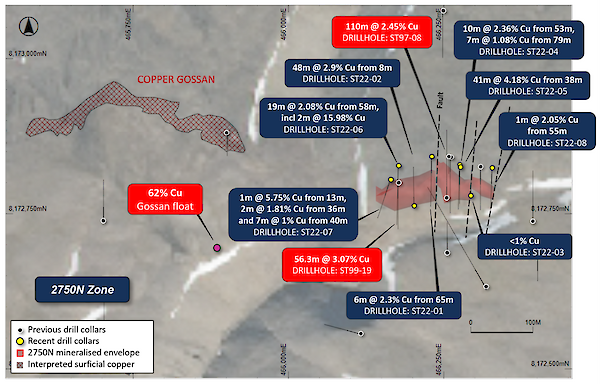
Figure 1: Plan view of the 2750N Zone showing drilling and gossans over aerial photography. Stated drill hole intersections are all core length, and true width is expected to be 60% to 95% of core length.
The final batch of assays results has been received for diamond drill holes ST22-03, ST22-04, ST22-06, ST22-07 and ST22-08 (Table 1). A total of 997m of shallow drilling was completed at the 2750N Zone during the 2022 program (See Table 3 for previously reported significant intervals).
All drill holes completed at the 2750N Zone were designed to test the continuity and extensions to the copper mineralization encountered in historical drilling (Figure 1) and to confirm the potential for potentially mineable volumes of copper mineralization.
Thick intervals of copper mineralization in these recent drill holes located in the western portion of the 2750N Zone give strong indications that the mineralization may continue across a large north-south oriented gully (interpreted to be a fault). High-grade copper at surface and extensive geochemical anomalies along strike of the 2750N Zone supports the growth potential of the prospect to extend a significant distance to the west.
Drilling within the east portion of the 2750N Zone shows that the mineralization may pinch out or be offset by faulting. The results of surface geochemistry to the east supports the apparent waning in the strength of near surface mineralization in this direction.
Faults are believed to be a major control on mineralization. Further drilling will aim to define the structural architecture of the 2750N Zone and to expand the economic potential of the Storm Project by defining additional resources at the highly prospective 2200N and 4100N Zones. These opportunities offer outstanding upside and large-scale potential for a low-footprint, direct shipping product (DSP) type operation.
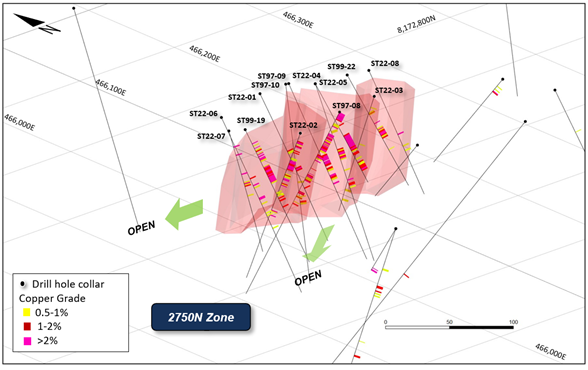
Figure 2: Orthographic view of the 2750N drilling showing mineralized envelope (>0.5% Cu) and copper grades
Drill Hole Details
Drill holes ST22-06 and ST22-07 were drilled in the western part the 2750N Zone and successfully encountered thick intervals of copper sulfides.
Mineralization encountered in these two drill holes is similar to that observed in other drill holes in this area and, importantly, is dominantly chalcocite. Mineralization at Storm is typically zoned, with a margin of pyrite-chalcopyrite-sphalerite-galena mineralization surrounding a copper-rich chalcocite core (chalcocite contains 79.9% copper). The presence of chalcocite suggests that these two drill holes are in the core of the mineralized system, with additional mineralization potentially located to the west.
Drill holes ST22-03, ST22-04 and ST22-08 are all located in the eastern portion of the 2750N Zone.
ST22-04 was drilled within the same section as ST22-05 and encountered strong copper mineralization, including 2m @ 4.04% Cu and 1m @ 8.29% Cu within a broader interval of 10m @ 2.36% Cu from 53m downhole.
The assay results for ST22-03 and ST22-08 shows intervals of lower grade copper, which is a function of the fined grained/veinlet style of the mineralization encountered in these drill holes.
The assays also indicate that some mineralization initially logged within ST22-03 and ST22-08 is sooty pyrite and marcasite, not chalcocite, and this would support the interpretation that this may be a marginal part of the ore system to the east within this zone.
Another interpretation is that the mineralization in the east may be offset by a series of north-south oriented faults. The presence of brecciated rock in drill hole ST22-02 and at the surface, accompanied with very fine-grained (sooty and potentially milled) pyrite and apparent left-lateral offset of the zone may indicate fault offsets of the mineralization.
The drill holes completed this year within the 2750N Zone have confirmed the thicknesses and grade of the historical copper intersections and continuity between drill holes. The mineralized system is interpreted to be open to the west and we expect further discoveries along strike. Early indications suggest that given the high grades, increasing volumes and shallow nature of the copper mineralization, there is high potential that the 2750N Zone could support an initial small footprint DSP type operation.
Table 1 summarises the significant intersections in drill holes ST22-03, ST22-04, ST22-06, ST22-07 and ST22-08. Intersections are expressed as downhole widths and are interpreted to be approximately 60 to 95% of true width. A cut-off grade of 0.5% copper is used to define a significant intersection and is based on sulphide mineralogy, mineralization habit and expected beneficiation performance. Previously announced significant drill intervals from the 2022 drilling program are presented in Table 3.
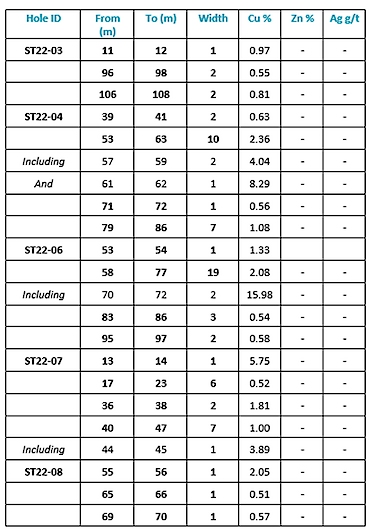
Table 1: Summary of significant drilling intersections for drill holes ST22-03, ST22-04, ST22-06, ST22-07 and ST22-08 (>0.5% Cu).
Expansion Potential of Near Surface Mineralization
This drill program has highlighted the continuity of the near surface copper mineralization and the potential for significant tonnages within the 2750N Zone. This zone is one of five major zones of high-grade mineralization that has been identified by historical exploration; four remaining zones await follow-up drilling to confirm potential additional copper mineralization.
The areas of immediate exploration interest are the 2200N and 4100N Zones, where thick intervals of copper mineralization have already been defined by historical drilling. Additional drilling at these zones is expected to significantly increase the scale of the near surface copper mineralization within the Storm Project area.
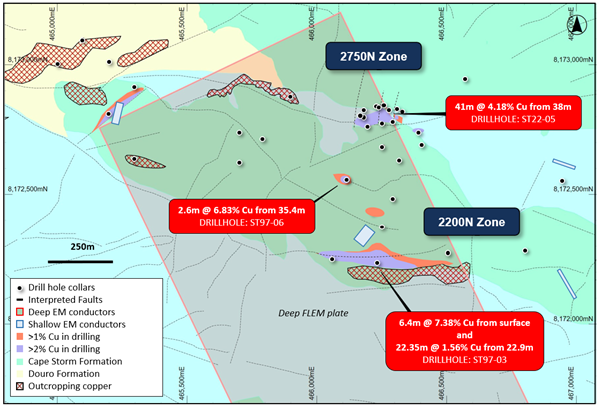
Figure 3: Plan view of the 2200N and 2750N Zones showing copper grade distribution within drilling, shallow and deep EM anomalies, outcropping copper mineralization and faults overlaying regional geology. The largely untested 2200N Zone has a strike extent of at least 300m. Stated drill hole intersections are all core length, and true width is expected to be 60% to 95% of core length.
2200N Zone
The 2200N Zone is located approximately 540m to the south of the 2750N Zone and is characterized by extensive outcropping of chalcocite over several hundred metres. The 2200N Zone is also located within an area of faulting related to the main graben structures.
Historical drilling has intersected bornite and chalcocite mineralization including 6.4m* @ 7.38% Cu from surface and 22.35m* @ 1.56% Cu from 22.9m downhole (ST97-03), similar to the 2750N Zone. Drill hole and geochemical data indicate that the main part of the 2200N Zone may be up to 300m long, 60m wide and 40m thick.
Extensions to this zone are supported by the presence of a shallow and strong Fixed Loop Electromagnetic (FLEM) anomaly that was defined in the 2021 survey (see December 14, 2021 news release) and historical Induced Polarization (IP) data.
Both the 2750N and 2200N Zones are located above a large, flat lying and deeper 1,800 x 1,000m Fixed Loop Electromagnetic (FLEM) anomaly that was also identified in the 2021 EM program. This feature is coincident with strong gravity anomalism between the major graben faults (Figure 5), which is an ideal location for the accumulation of sedimentary copper mineralization.
4100N Zone
The 4100N Zone is a blind zone of mineralization defined by a historical Versatile Time domain Electromagnetics (VTEM) anomaly that is over 1km long, and multiple untested shallow FLEM plates that were defined in the 2021 survey. Given the lack of false-positive anomalies encountered in drilling to date and extensive copper mineralization in historical holes, these EM conductors could represent further occurrences of copper sulfide mineralization.
Historical drilling at the 4100N Zone includes 15m* @ 3.88% Cu (ST99-47), and 4.8m* @ 3.7% Cu and 5.8m* @ 3.6% Cu (ST99-53). The copper mineralization intersected to date is dominantly chalcocite, which occurs in breccias and steeply dipping veins (typical of the near surface mineralization at Storm).
The 4100N offers considerable room for expansion (Figure 4). The known mineralization in the zone extends over an area of at least 1,000m x 400m and is open to the north, east and west, with potential for deep extensions to the mineralization across a fault on the south side of the Zone. Seventeen holes have been drilled at spacings of 100m to 200m, and all have encountered copper mineralization. The mineralization drilled to date is irregular but extensive and lies at a predictable stratigraphic position.
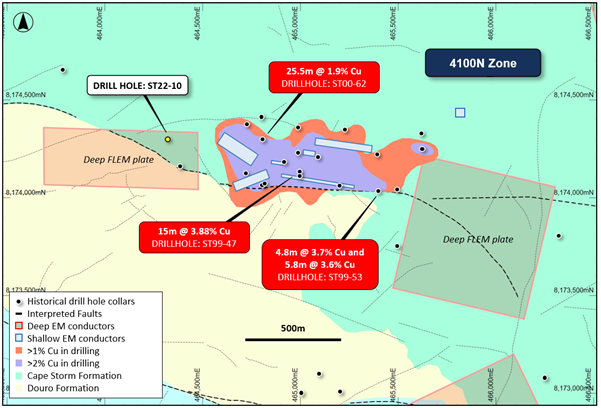
Figure 4: Plan view of the 4100N Zone showing copper grade distribution within drilling, shallow/deep EM anomalies and faults overlaying regional geology. The main 4100N Zone has drill hole copper intersections supported by untested EM anomalies over 1km of strike. Stated drill hole intersections are all core length, and true width is expected to be 60% to 95% of core length.
The recent drill results from hole ST22-10 (see September 28, 2022 news release) suggest that near surface mineralization is related to a large sedimentary copper style system at depth. This large-scale potential is highlighted by a series of coincident EM, IP and gravity anomalies in the 4100N Zone, which are over 5km in length (Figure 5).
The 2200N and 4100N zones present as compelling and high priority target areas to add further potential high-grade copper resources at surface, and to significantly increase the scale of the copper endowment within the Storm Project. In addition, there remains considerable discovery potential in exploration of the deeper FLEM conductors that may represent sedimentary copper style mineralization.
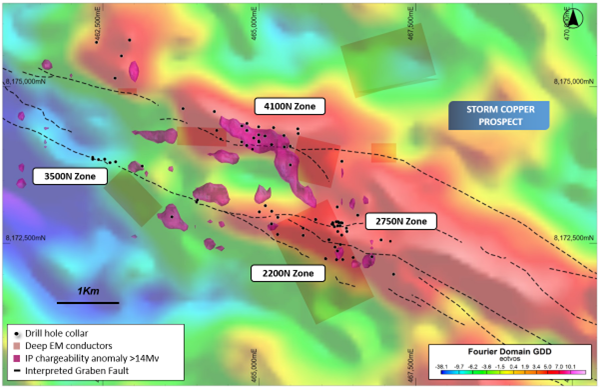
Figure 5: Plan view of the entire Storm Project area showing drilling, major graben faults, deep electromagnetic plates and induced polarization anomalies overlaying regional gravity image. Note that the coincident IP, EM and strong gravity anomalies lay adjacent to or between the major graben faults – typical locations for the accumulation of sedimentary copper style mineralization.
Drilling Program Summary
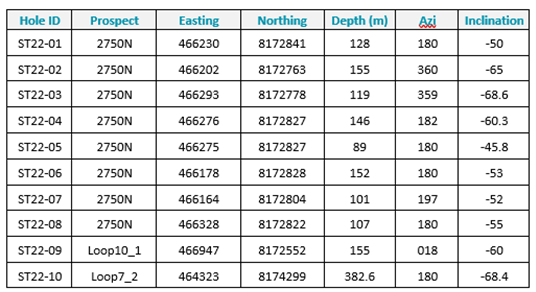
Table 2: Drill hole details.
Planned Program
Work will continue to progress both the near-surface development and exploration/discovery paths for the Storm Project.
Further diamond drilling is planned to expand the shallow, high-grade 2750N Zone, and to define initial resources at the 4100N and 2200N Zones where shallow high-grade copper mineralization has been intersected in historical drilling.
Exploration activities including drilling and geophysics are also planned to follow-up the significant new discovery of sediment hosted style copper mineralization, which is associated with a large EM anomaly to the west of the previously recognized and highly mineralized 4100N Zone. With six EM anomalies similar to the one that has successfully yielded copper mineralization remaining to be tested, there is potential for multiple large-scale mineralized systems to occur at these deeper levels. Physical properties measurements on drill core from the new discovery will also be conducted to further refine the geophysical modeling and future drill targeting.
Beneficiation and metallurgical test work will soon commence on drill core (ST22-02) from this year’s program. The aim of this work is to create a definitive flow sheet for a direct shipping product operation from the 2750N Zone. Previous test work on Storm drill core has produced a >53% copper product using a full-scale ore sorter and with no further processing or optimization (see April 11, 2022 news release).
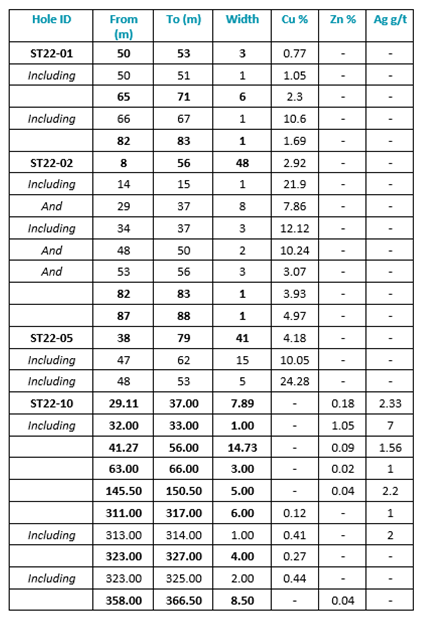
Table 3: Significant drill intervals announced previously for the 2022 drilling program. Interval cut-off grades for ST22-01, ST22-02 and ST22-05 (>0.5% Cu), and for exploration drill hole ST22-10 (>0.1% Cu, >0.01 Zn).
About the Storm Copper and Seal Zinc-Silver Projects, Nunavut
The Nunavut property consists of 117 contiguous mining claims and six prospecting permits covering an area of approximately 302,725 hectares on Somerset Island, Nunavut, Canada. The Storm Project comprises both the Storm Copper Project, a high-grade sediment hosted copper discovery (intersections including 110m* @ 2.45% Cu from surface and 56.3m* @ 3.07% Cu from 12.2m) as well as the Seal Zinc Deposit (intersections including 14.4m* @ 10.58% Zn, 28.7g/t Ag from 51.8m and 22.3m* @ 23% Zn, 5.1g/t Ag from 101.5m). Additionally, there are numerous underexplored targets within the 120-kilometre strike length of the mineralized trend, including the Tornado copper prospect where 10 grab samples yielded >1% Cu up to 32% Cu in gossans.
*Stated drill hole intersections are all core length, and true width is expected to be 60% to 95% of core length.
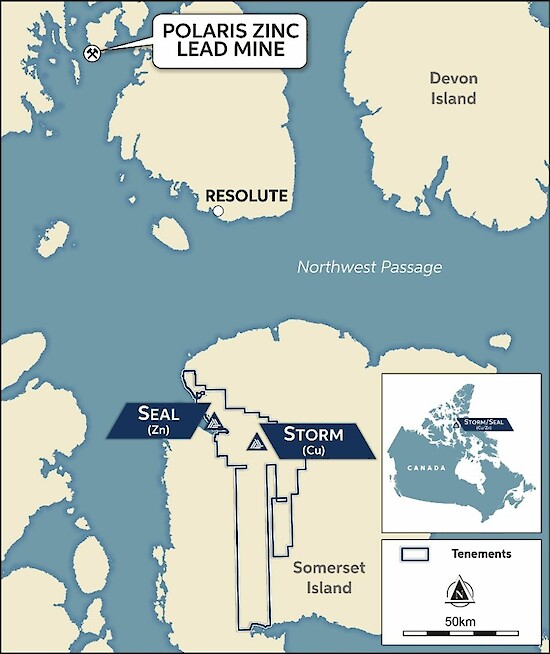
Figure 6: Storm Copper Project, Location Map.
QA/QC Protocols
The analytical work reported on herein was performed by ALS Global (“ALS”), Vancouver Canada. ALS is an ISO-IEC 17025:2017 and ISO 9001:2015 accredited geoanalytical laboratory and is independent of Aston Bay Holdings Ltd., American West Metals Limited, and the QP. Drill core samples were subject to crushing at a minimum of 70% passing 2 mm, followed by pulverizing of a 250-gram split to 85% passing 75 microns. Samples were subject to 33 element geochemistry by four-acid digestion and inductively coupled plasma atomic emission spectroscopy (ICP-AES) to determine concentrations of copper, silver, lead, zinc, and other elements (ALS Method ME-ICP61a). Overlimit values for copper (>10%) and were analyzed via four-acid digestion and ICP-AES (ALS Method Cu-OG62).
Aston Bay Holdings Ltd. and American West Metals Limited followed industry standard procedures for the work carried out on the Storm Project, incorporating a quality assurance/quality control (QA/QC) program. Blank, duplicate, and standard samples were inserted into the sample sequence and sent to the laboratory for analysis. No significant QA/QC issues were detected during review of the data. Aston Bay Holdings Ltd. and American West Metals Limited are not aware of any drilling, sampling, recovery, or other factors that could materially affect the accuracy or reliability of the data referred to herein.
Qualified Person
Michael Dufresne, M.Sc., P.Geol., P.Geo., is a qualified person as defined by National Instrument 43-101 and has reviewed and approved the scientific and technical information in this press release.
About Aston Bay Holdings
Aston Bay is a publicly traded mineral exploration company exploring for high-grade copper and gold deposits in Virginia, USA, and Nunavut, Canada. The Company is led by CEO Thomas Ullrich with exploration in Virginia directed by the Company's advisor, Don Taylor, the 2018 Thayer Lindsley Award winner for his discovery of the Taylor Pb-Zn-Ag Deposit in Arizona. The Company is currently exploring the high-grade Buckingham Gold Vein in central Virginia and is in advanced stages of negotiation on other lands with high-grade copper potential in the area.
The Company is 100% owner of the Storm Project property, which hosts the Storm Copper Project and the Seal Zinc Deposit and has been optioned to American West Metals Limited.
About American West Metals Limited
AMERICAN WEST METALS LIMITED (ASX: AW1) is an Australian company focused on growth through the discovery and development of major base metal mineral deposits in Tier 1 jurisdictions of North America.
They are a progressive mining company focused on developing mines that have a low-footprint and support the global energy transformation.
Their portfolio of copper and zinc projects include significant existing mineral resource inventories and high-grade mineralization that can generate robust mining proposals. The company is commitment to the ethical extraction and processing of minerals and making a meaningful contribution to the communities where our projects are located.
The company is led by a highly experienced leadership team, with strategic initiatives that lay the foundation for a sustainable business which aims to deliver high-multiplier returns on shareholder investment and economic benefits to all stakeholders.
For further information on American West, visit: www.americanwestmetals.com.
FORWARD-LOOKING STATEMENTS
Statements made in this news release, including those regarding the Option Agreement, grant of the Option and the expected closing date, American West’s interest in the Storm Project and its other acquisitions and plans, plans for the upcoming field season, management objectives, forecasts, estimates, expectations, or predictions of the future may constitute “forward-looking statement”, which can be identified by the use of conditional or future tenses or by the use of such verbs as “believe”, “expect”, “may”, “will”, “should”, “estimate”, “anticipate”, “project”, “plan”, and words of similar import, including variations thereof and negative forms. This press release contains forward-looking statements that reflect, as of the date of this press release, Aston Bay’s expectations, estimates and projections about its operations, the mining industry and the economic environment in which it operates. Statements in this press release that are not supported by historical fact are forward-looking statements, meaning they involve risk, uncertainty and other factors that could cause actual results to differ materially from those expressed or implied by such forward-looking statements. Although Aston Bay believes that the assumptions inherent in the forward-looking statements are reasonable, undue reliance should not be placed on these statements, which apply only at the time of writing of this press release. Aston Bay disclaims any intention or obligation to update or revise any forward-looking statement, whether as a result of new information, future events or otherwise, except to the extent required by securities legislation.